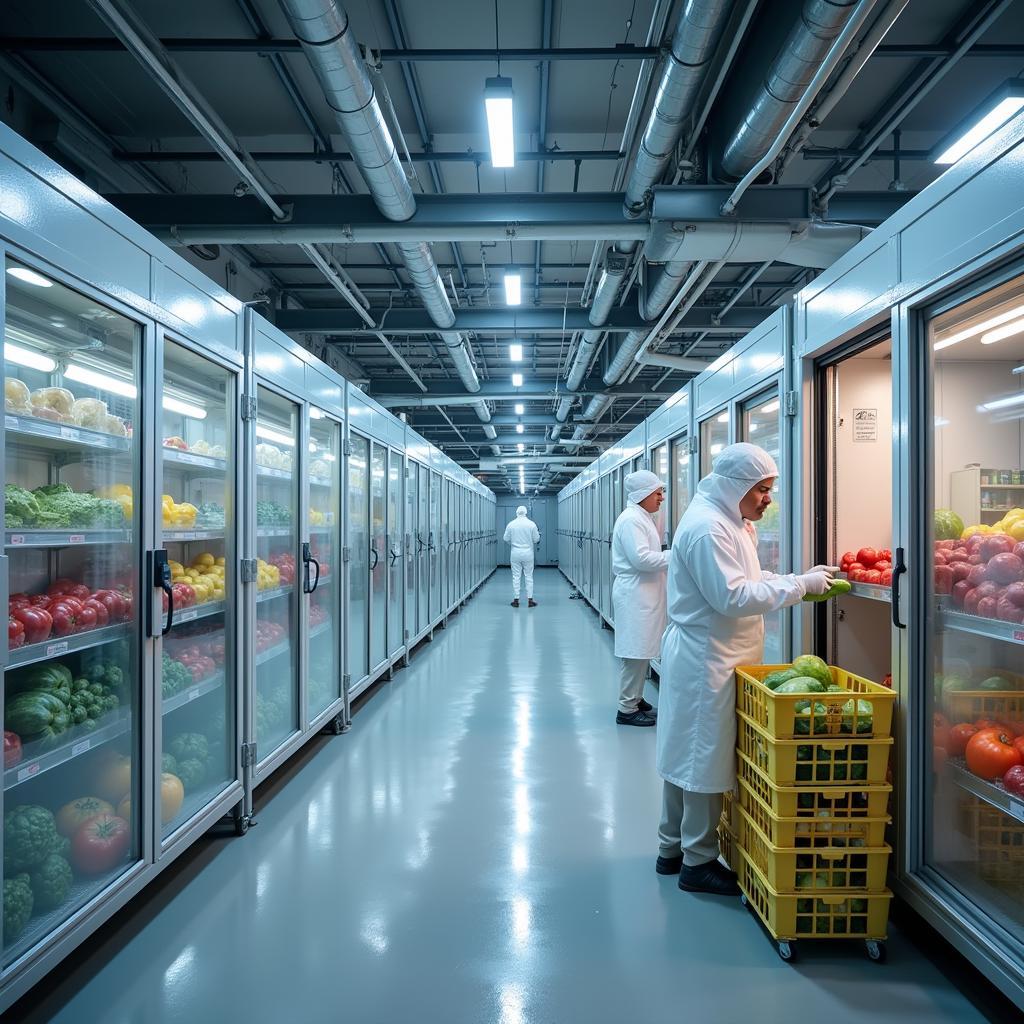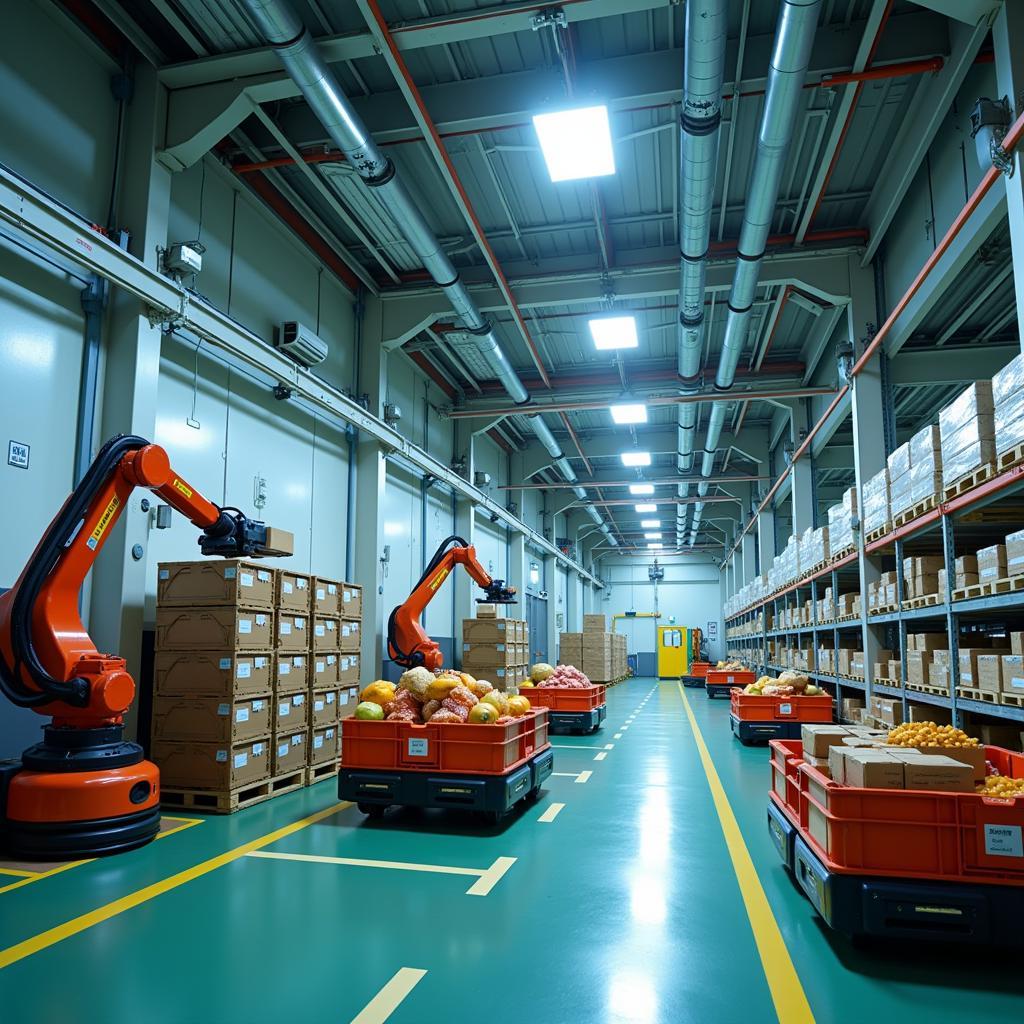Food Storage Companies play a vital role in our modern food system, ensuring we have access to a variety of foods year-round. Whether you’re a restaurant owner, a food manufacturer, or simply looking for efficient home storage solutions, understanding the landscape of food storage companies is crucial. This guide will explore the different types of food storage companies, factors to consider when choosing one, and the future trends shaping this industry.
Different Types of Food Storage Companies: From Warehouses to Your Pantry
The world of food storage is diverse, encompassing various methods and scales. Let’s break down the main types:
Warehouse and Distribution Centers
These large-scale facilities are the backbone of the food supply chain. They utilize advanced refrigeration, freezing, and controlled atmosphere technologies to store vast quantities of food products before distribution.
Cold Storage Facilities
Specializing in temperature-controlled environments, these facilities cater to perishable goods like fruits, vegetables, meats, and dairy. They maintain strict temperature ranges to preserve quality and prevent spoilage.
Dry Storage Warehouses
Ideal for non-perishable items such as canned goods, grains, and packaged foods, these warehouses focus on maintaining optimal humidity levels and pest control.
Specialized Storage Facilities
Certain food products require unique storage conditions. Think of controlled atmosphere storage for apples or temperature-sensitive pharmaceuticals requiring specialized refrigeration. These facilities cater to those niche needs.
 Specialized Food Storage Facility with Controlled Atmosphere Technology
Specialized Food Storage Facility with Controlled Atmosphere Technology
Home Food Storage Solutions
Beyond industrial-scale storage, numerous companies offer solutions for home food preservation. These range from vacuum sealers and specialized containers to small paper bags for food for smaller portions. These options help extend the shelf life of groceries and reduce food waste.
Choosing the Right Food Storage Company: Key Considerations
Selecting the appropriate food storage company requires careful evaluation. Here are some critical factors:
- Food Safety Certifications and Standards: Ensure the company adheres to stringent food safety regulations and certifications like HACCP and FDA guidelines.
- Technology and Infrastructure: Modern technology plays a crucial role in maintaining food quality. Look for companies investing in state-of-the-art storage systems and monitoring equipment.
- Location and Logistics: Proximity to your business and efficient transportation networks can significantly impact delivery times and costs.
- Scalability and Flexibility: Choose a company that can adapt to your changing needs, whether you’re experiencing seasonal fluctuations or business growth.
Understanding Your Specific Needs
Before contacting food storage companies, thoroughly assess your requirements. What type of food are you storing? What are your volume requirements? What’s your budget? Answering these questions will streamline your search.
“Understanding your specific needs is the cornerstone of choosing the right storage partner,” says renowned food logistics expert, Amelia Carter, CEO of Food Logistics Solutions. “It’s not just about capacity, it’s about compatibility with your specific product requirements.”
The Future of Food Storage: Innovation and Sustainability
The food storage industry is constantly evolving. Here are some key trends:
- Automation and Robotics: Automated storage and retrieval systems (AS/RS) are becoming increasingly prevalent, improving efficiency and reducing labor costs.
- Blockchain Technology: Blockchain can enhance transparency and traceability within the food supply chain, tracking products from farm to table.
- Sustainable Practices: Energy-efficient refrigeration systems and eco-friendly packaging are gaining traction as companies strive to minimize their environmental impact.
 Automated Food Storage Facility with Robotic Systems
Automated Food Storage Facility with Robotic Systems
Conclusion: Securing Your Food Supply Chain
Choosing the right food storage companies is paramount for businesses in the food industry. By understanding the different types of facilities, considering key factors like food safety and technology, and staying abreast of emerging trends, you can make informed decisions that optimize your operations and safeguard your food supply chain. Remember, efficient food storage is not just about preserving goods; it’s about preserving quality, reducing waste, and ultimately, contributing to a more sustainable food system. Food storage companies are an essential link, and with careful selection, you can strengthen yours.
FAQ
- What are the different types of food storage companies?
- How do I choose the right food storage company?
- What are the key factors to consider when selecting a food storage facility?
- What are the future trends in the food storage industry?
- How can food storage companies help me reduce food waste?
- What certifications should I look for in a food storage company?
- How can technology improve food storage practices?
“Efficient food storage contributes significantly to reducing food loss, minimizing environmental impact, and optimizing resources,” says Dr. James Peterson, a leading food scientist specializing in preservation techniques. “Investing in modern storage solutions is an investment in the future of food.”
For businesses looking to streamline their food packaging and labeling process, exploring options like food labels stickers and festive food hampers can be incredibly beneficial. Similarly, if you’re in Pennsylvania and need guidance on food handling regulations, a resource like food handlers permit pa can be invaluable. For creative promotional materials, consider stickers food.
When you need support, please contact Phone Number: 02437655121, Email: [email protected] Or visit the address: 3PGH+8R9, ĐT70A, Trung village, Bac Tu Liem, Hanoi, Vietnam. We have a 24/7 customer service team.